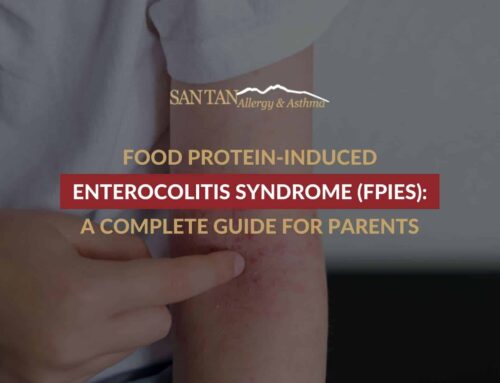Gilbert Allergy Doctors Explain The Importance Of Peanut Allergy Treatment Plans
Approximately one million American children have an allergy to peanuts. Unfortunately, only about 20 percent of them will end up “outgrowing” their peanut allergy. The best way to deal with your own allergies, or your child’s allergies, is to see a Queen Creek allergy doctor for your own personalized evaluation and treatment plan.
Some people with a peanut allergy have only a fairly mild allergic response. They may develop hives, swelling, digestive problems, or stomach pain. In very severe cases, people with peanut allergies can develop life threatening reactions, such as swelling around their airway or blood flow restriction. Your Chandler allergy expert can help you with symptom relief, whether that is mainly for comfort and peace of mind, or to reduce the severity of a more serious reaction until you can get emergency help. Most often, it is somewhere in between.

Facts About Peanut Allergy
Here are some simple facts about peanut allergy from a Mesa allergist:
- Especially among children, allergy to peanuts is one of the most common allergies.
- Allergies to food, including peanuts, can be potentially fatal. This is because severe allergic reactions include swelling in the throat, which can restrict or prevent breathing, as well as low blood pressure and anaphylaxis.
- About 3 million people in the United States, including 1 million children, suffer from allergies to tree nuts or peanuts.
- Tree nuts include almonds, cashews, macadamia nuts, and walnuts. Peanuts are in the legume family, which also includes beans, peas, and soy. Many people assume coconut is also a nut, but it is actually a seed.
- While many people will suffer with allergies for their entire lives, about 20% of children eventually outgrow their allergies.
- There is a genetic component to peanut allergies, making it more likely that you will have an allergy if someone in your family also does.
- It is considered best to introduce peanuts to children while they are young. However, it should be done with caution and careful monitoring for allergic reactions.
Peanut Allergy Prevention
In order to prevent mild or severe allergic reactions to peanuts, set up a consultation with a Gilbert allergy expert. Likely, you will be asked to undergo allergy testing to confirm whether peanuts are the cause of your allergies, and to determine whether any other foods or substances are causing your allergic reactions. You may also be asked to keep a food diary to track foods, medications, and supplements. If you know that peanuts are the source of your allergic reactions, be sure to remove them from your diet to avoid worsening reactions while you wait for advice from your Chandler allergy doctor.
You can use an elimination and reintroduction method to help confirm the source of your allergies. For a full week, do not consume any peanuts or foods containing any traces of peanuts. You’ll need to read processed food labels carefully. After that, reintroduce a small amount of peanut into your diet to see if you have any reactions. Of course, do this with caution and only under the guidance of a Mesa allergy doctor in case of a severe reaction.
Common Peanut Allergy Treatments
Your Chandler allergist will guide you through the best treatment for your situation. Commonly used treatments include epinephrine (EpiPen) and antihistamines. Unfortunately, sometimes these medications may not prevent severe reactions even when taken as directed and in sufficient doses.
At the beginning of 2020, the Food and Drug Administration (FDA) approved the drug Palforzia for the treatment of peanut allergy reactions. This medication helps reduce or minimize the symptoms of peanut allergy, including severe reactions such as anaphylaxis. Currently, it is approved for patients age four and older. Palforzia is administered in three phases. First is the initial dose escalation, in which the treatment is given for one day. The second phase is updosing, which involves gradually increasing the dosage over several months. The third and final phase is maintaining the dosage at home. Ask your Gilbert allergy expert if Palforzia is a good option for you.
Be Careful With Peanut Allergic Reactions
Peanut allergy is just one of many types of food allergies, although it is one of the most common. Reactions can range from mild to life threatening, and may change over time. If you have a peanut allergy, you’ll need to carefully check food labels to prevent accidental consumption of peanut products. For the best care, consult a Mesa allergy expert.
Make An Appointment With a Top-Rated Allergy Clinic In Arizona
If you are struggling with peanut allergies, contact San Tan Allergy and Asthma for an appointment. We are one of the top rated allergy clinics in Arizona with hundreds of five star reviews. Our mission is to provide patient centered care with unique treatment plans tailored for each individual. You can feel confident you’re receiving the best care with our evidence-based approach. Contact San Tan Allergy and Asthma today. Our friendly and knowledgeable doctors are ready to help relieve your allergy symptoms and improve your life!

San Tan Allergy & Asthma
4915 E Baseline Rd #112
Gilbert, AZ 85234
Phone: 480-626-6600
Email: officemanager@santanallergy.com
Website: https://santanallergy.com/







